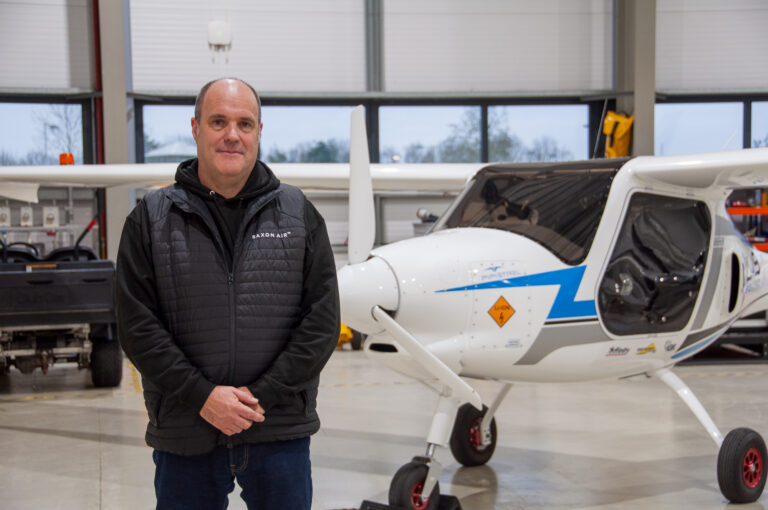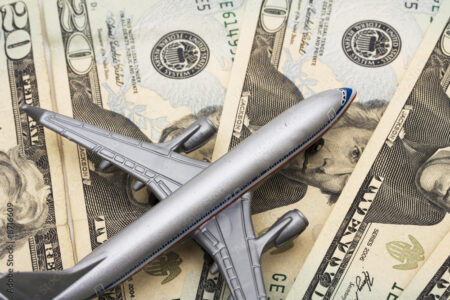Alex Durand is CEO of Saxon Air, a global aircraft charter and management company based at Norwich Airport, UK. Under Durand’s leadership, Saxon Air has transformed into a leading example of how to incorporate Net Zero goals and take action towards achieve them into an aviation business.
Saxon Air first started taking steps to reduce its emissions in 2019, with a mapping exercise to assess its carbon footprint run by Air BP. Durand appointed a full-time sustainability manager in 2019 – an unusual position in a company that employs just 70 people – to help implement measures towards the goal of Net Zero emissions by 2030.
The result is a company that generates half of its energy needs from a large onsite solar PV installation commissioned in February 2024. This came after the company switched all of its ground support equipment (GSE) to electric and campaigned hard for Norwich Airport’s introduction of sustainable aviation fuel (SAF) in 2023.
Other recent achievements include the launch of a flight training school that offers the use of a Velis Electro and in October 2024 installed the UK’s first electric aircraft charge point at a regional airport.
“We do this because it’s the right thing to do. You have to be accountable,” Durand says.
Small steps
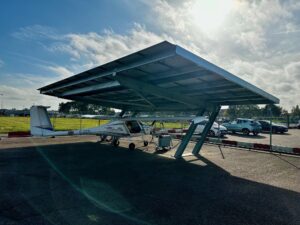
The solar panel array, electric GSE, aircraft and charge point are just the most visible Net Zero milestones at Saxon Air. But there are many smaller changes behind the scenes that add up in terms of emissions reductions, and have had the side effect of positively impacting the company’s culture.
These include promoting car-free commuting through reduced parking, a Bike 2 Work scheme, a 50% reduction in office space and glass-only water drinking, as well as buildng several beehives on-site.
“The small steps are just as important as the large ones. And often they double up in terms of being good for the business in terms of economics,” says Durand. “Be open and honest and the mapping can be transformative. Yes, it has a carbon focus, but you are reviewing your business processes to become better, and it forces you to find and work with innovators in new ways.”
Expansion challenge
Overall Saxon Air is 37% less emissive than in 2019, a great achievement. But Durand recognizes that one of the biggest challenges on the horizon is expanding the business in an environmentally responsible way that does not erode this figure.
Extra effort will be made next year to push the uptake of SAF more heavily at the FBO. Durand believes SAF offers the best way for business aviation to reduce emissions in the short term, and the sector should pressurize the supply chain to produce more of the sustainable fuel.
Saxon Air is also looking at the possibility of setting up a wind farm to generate more of the energy it needs. “It’s a bit leftfield, but we are limited with solar. When we are producing our own energy in a carbon-positive way, we are outweighing what we are using,” he says.
Another plan is to offer consultancy services to companies that want to develop and implement Net Zero strategies. “People have started coming to us for advice,” says Durand. “We want to be in a leadership position and help spread good practice through the industry.
“We aren’t arrogant enough to think we have all the answers, but we can’t be commercially naïve. We are a business that needs to make money and these things cost.”
Sustained action and communication
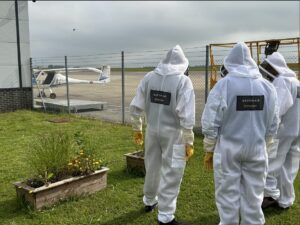
Over the last five years, there has been other aspects of the company’s Net Zero journey that can act as learning points. The first is data. There is a lot and it constantly needs reviewing and redefining, says Durand.
Related is standards. Saxon Air uses two different standards for environmental auditing, but Durand says it is important not to get bogged down in the scientific detail, as long as the direction of travel is correct. The company also uses carbon offsetting but is careful about the schemes it is involved with.
Finally, there is communication. Measures should be implemented for the reason of corporate social responsibility, but remaining silent about it serves no one’s best interests, least of all the company.
Here, Durand points to the positive engagement it has experienced with the local community around its electric aircraft and flight school: “There is a reticence about aviation now, particularly from the younger generation. The electric aircraft breaks down the barriers,” he says.
“Once they see it parked under the canopy and you explain it charges from the sun and you just go off and fly it, you can see an uninhibited smile grow on their face and the engagement grows.
“Electric aviation is a return to the guilt-free flying we enjoyed before we knew about climate change. It means you can focus on telling people how aviation enriches communities by connecting people and places.”
Measuring success
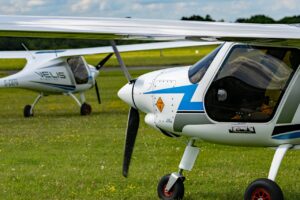
Durand and Saxon Air’s Net Zero strategy is driven by a passion for aviation, as well as a sense of duty to do the right thing. Durand is a thoughtful and articulate advocate on how and why business aviation can and must act to help combat climate change. Saxon Air is proof that a company can do the right thing and still profit and expand.
“The conversation around climate change can degenerate into finger-pointing, but we are not the number one evil in the world, there are other high emitters. If business aviation stops, nothing changes – it doesn’t have the significance people think it does,” says Durand.
“Meanwhile, the actions we are taking are measurable and have clear objectives. They are a good thing and inspirational to the community.
“Doing nothing is not working, it just grows and empowers the protest movement. If you are unsure what to do, the answer is to do more. You won’t be disappointed with the results. It will inspire and drive innovation in your business. ”


